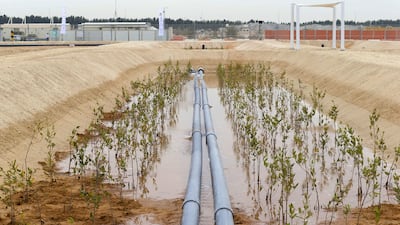The world’s first research facility aimed at finding a way to grow food as well as biofuels using desert land irrigated with seawater has opened in Abu Dhabi.
The facility is based at Masdar City and will be operated by Masdar Institute of Science and Technology, with funding coming from the Sustainable Bioenergy Research Consortium – a group whose goal is to cut the aviation industry’s carbon emissions.
Group members include Masdar Institute, Etihad Airways, the plane maker Boeing, GE Aviation, engineering company Honeywell, French aircraft engine maker Safran and Abu Dhabi refining company Takreer.
The UAE imports about 90 per cent of its food, but it is hoped that by promoting aquaculture using seawater, the country could grow more of its own fish and shellfish.
Aquaculture has been a fast-growing global food market, increasing by about 6 per cent each year, but there have been concerns about the environmental damage that can be caused by nutrient-rich effluent discharged by the fish stocks.
The research hub will use coastal seawater to raise fish and shrimp for food and then use the nutrient-rich wastewater as fertilizer for plants rich in oils that can be harvested for aviation biofuel.
These salt-tolerant plants, the halophytes, thrive in arid, desert conditions and do not require fresh water or arable land to grow. Any remaining wastewater then passes through a cultivated mangrove, which naturally filters more of the nutrients before it is discharged into the sea.
The trial for the technology is being run on a small scale, but if it proves to be viable, a 200-hectare demonstration site is planned.
The UAE’s Minister of Climate Change, Thani Al Zeyoudi, said: “This project will not only sustainably produce bioenergy but also offer a pathway to grow our aquaculture industry, which supports food independence.”
Kevin Fitzsimmons, a professor of environmental science at the University of Arizona, said: “Aquaculture systems are here to stay. As the planet’s population approaches nine billion people, we must advance technologies that enable sustainable and manageable food production.”
James Hogan, the chief executive of Etihad, said the new research centre “places the UAE at the centre of a global movement to advance technology that supports sustainable production of food and bioenergy.
“The commercialisation of aviation fuels – cleaner, superior-performing fuels – is a critical step towards balancing our industry’s dependency on fossil fuels,” he said.
The UAE was the highest-ranked Arab country in The Economist's most recent Global Food Security Index, which was published last May.
The country came 23rd in the ranking of 109 countries for food security, with high marks granted for its affluence, the presence of food safety net programmes and its food safety and nutrition standards. One challenge identified was a lack of public spending on agricultural research.
mfahy@thenational.ae
Follow The National's Business section on Twitter


